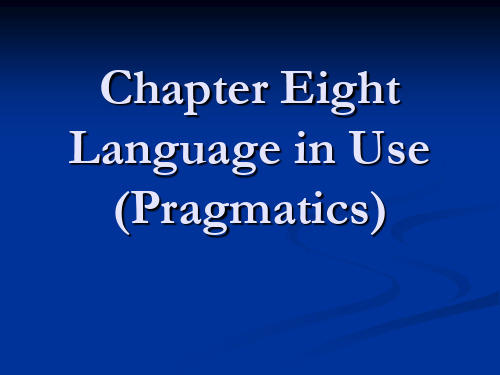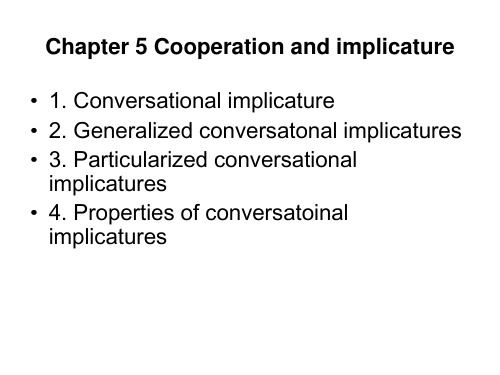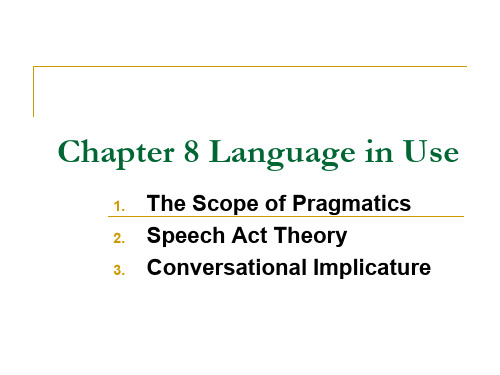语言学pragmatics的ppt
合集下载
英语语言学第八章 语用学 pragmatics ppt课件

utterance, i.e. the act ostin
How to Do Things with Words (1962)
speech acts: actions performed via utterances
Constatives vs. performatives Constatives: utterances which roughly serves
Semantic meaning: the more constant, inherent side of meaning
Pragmatic meaning: the more indeterminate, the more closely related to context
2. Speech Act Theory
(ii) the relevant participants and circumstances must be appropriate.
B. The procedure must be executed correctly and completely.
C. Very often, the relevant people must have the requisite thoughts, feelings and intentions, and must follow it up with actions as specified.
Minister: addressing the groom) (Groom’s Name), do you take (Bride’s Name) for your lawful wedded wife, to live together after God’s ordinance, in the holy estate of matrimony? Will you love, honor, comfort, and cherish her from this day forward, forsaking all others, keeping only unto her for as long as you both shall live?
How to Do Things with Words (1962)
speech acts: actions performed via utterances
Constatives vs. performatives Constatives: utterances which roughly serves
Semantic meaning: the more constant, inherent side of meaning
Pragmatic meaning: the more indeterminate, the more closely related to context
2. Speech Act Theory
(ii) the relevant participants and circumstances must be appropriate.
B. The procedure must be executed correctly and completely.
C. Very often, the relevant people must have the requisite thoughts, feelings and intentions, and must follow it up with actions as specified.
Minister: addressing the groom) (Groom’s Name), do you take (Bride’s Name) for your lawful wedded wife, to live together after God’s ordinance, in the holy estate of matrimony? Will you love, honor, comfort, and cherish her from this day forward, forsaking all others, keeping only unto her for as long as you both shall live?
Chapter 6 Pragmatics.ppt

• “Today is Sunday”, semantically, it means that today is the first day of the week; pragmatically, you can mean a lot by saying this, all depending on the context and the intention of the speaker, say, making a suggestion or giving an invitation…
• Note: Sometimes they are easy to get confused, e.g.“It is raining outside” can be a constative, and also a performative, for by uttering such a sentence, we may not only state a fact, but involve in the act of informing someone about the rain.
Some Examples of Performatives
• “I do” • “I name this ship Elizabeth.” • “I give and bequeath my watch to my brother.” • “I bet you sixpence it will rain tomorrow.” • “I declare the meeting open.”
• The locutionary act----an act of saying something, i.e. an act of making a meaningful utterance (literal meaning of an utterance);
• Note: Sometimes they are easy to get confused, e.g.“It is raining outside” can be a constative, and also a performative, for by uttering such a sentence, we may not only state a fact, but involve in the act of informing someone about the rain.
Some Examples of Performatives
• “I do” • “I name this ship Elizabeth.” • “I give and bequeath my watch to my brother.” • “I bet you sixpence it will rain tomorrow.” • “I declare the meeting open.”
• The locutionary act----an act of saying something, i.e. an act of making a meaningful utterance (literal meaning of an utterance);
《语用学Pragmatics》课件 第十一周

• (3) maxim of relation: Leila: Whoa! Has your boss gone crazy?
•
Mary: Let’s go get some coffee.
• (4) Bert: Do you like ice-cream?
• Ernie: Is the Pope Catholic? (+> obviously yes!)
•
He’s always ready to help.
•
He never leaves you in the lurch.
会话原则的违反和隐喻
• 反语(irony),隐喻(metaphor),夸张法 (hyperbole)和弱言法(meiosis)都是有意违 反会话的质量准则的结果.
会话原则的违反和隐喻
Chapter 5 Cooperation and implicature
• 1. Conversational implicature • 2. Generalized conversatonal implicatures • 3. Particularized conversational
implicatures • 4. Properties of conversatoinal
attendance at tutorials has been regular. However, his ability at and enthusiasm for philosophy are quite adequate for the job. • (2) You’re the cream in my coffee.------ But I’m afraid I don’t quite like cream in my coffee.
Chapter 8 Pragmatics 语用学 语言学教程 胡壮麟.ppt

(b) In a language class where a student made a mistake, for he intended to say “tidy”.
(c) The room was wanted for a meeting.
பைடு நூலகம்
(2) I can’t work under untidy circumstances.
are acts.
8.1.1 Performatives and constatives Austin (How to Do Things with Words,
1962) Consider these sentences: a) I name this ship Elizabeth. b) I bequeath my watch to my brother. c) I now pronounce you man and wife. d) I bet you sixpence it will rain
A. (i) There must be a relevant conventional procedure, and
(ii) the relevant participants and circumstances must be appropriate.
B. The procedure must be executed (i) correctly and (ii) completely.
Possible contexts:
(a) A request to someone to tidy up the circumstances.
(b) It was an excuse for not wanting to do something there.
(c) The room was wanted for a meeting.
பைடு நூலகம்
(2) I can’t work under untidy circumstances.
are acts.
8.1.1 Performatives and constatives Austin (How to Do Things with Words,
1962) Consider these sentences: a) I name this ship Elizabeth. b) I bequeath my watch to my brother. c) I now pronounce you man and wife. d) I bet you sixpence it will rain
A. (i) There must be a relevant conventional procedure, and
(ii) the relevant participants and circumstances must be appropriate.
B. The procedure must be executed (i) correctly and (ii) completely.
Possible contexts:
(a) A request to someone to tidy up the circumstances.
(b) It was an excuse for not wanting to do something there.
《英语语言学导论》(第四版)课件Chapter 7 Pragmatics

1) the relationships between linguistic forms; 2) the relationships between linguistic forms and entities in the
world; 3) the relationships between linguistic forms and the users of
Contents
1 Introduction to Pragmatics 2 Deixis and Reference
3 Speech Acts 4 Pragmatic Presupposition
5 The Cooperative Principle and Implicature
6
Apply PP to teaching in future Politeness
7.2.6 Social deixis
the encoding of social distinctions, or the use of deictic expressions to indicate social status of the interlocutors
● honorifics e.g. tu/vous (in French) du/sie (in German) nǐ/nín (in Chinese)
--- the addressees being audio-visually present during the utterances to be able to understand these expressions
e.g. I like that one, not this one.
7.2 Deixis and reference
world; 3) the relationships between linguistic forms and the users of
Contents
1 Introduction to Pragmatics 2 Deixis and Reference
3 Speech Acts 4 Pragmatic Presupposition
5 The Cooperative Principle and Implicature
6
Apply PP to teaching in future Politeness
7.2.6 Social deixis
the encoding of social distinctions, or the use of deictic expressions to indicate social status of the interlocutors
● honorifics e.g. tu/vous (in French) du/sie (in German) nǐ/nín (in Chinese)
--- the addressees being audio-visually present during the utterances to be able to understand these expressions
e.g. I like that one, not this one.
7.2 Deixis and reference
pragmatics ppt

2.对语言使用间接性的解释
• SA 理论认为语言使用的间接性来源于话语的词汇) 语义 结构, 例如:Can you pass me the salt? 这句话从表面 看是询问对方是否有能力把盐递过来, 但实际的言外之力 却是请求对方做这件事, 询问是次要的言外行为, 请求才 是主要的言外行为。它把话语当作第一位的,把语境、使 用者以及交际效果当作第二位的。
PA 是一种宏观的人类交际行为理论, 以行为对交际产生的 实际效果为中心, 把言语交际看作社团成员之间的社会) 文 化行为, 突出语境特别是社会、文化语境的重要作用, 认为 在“制度化了的社会活动中”, 情景(如教学、看病、茶会) 在某种程度上已经预先规定了言语的使用, 即依照情景,交 际者彼此期待对方使用某些话语, 这些话语将被认为是可 以接受的。 在情景中实施的SA 就是PA, 但PA不一定是SA, 因为PA也 可以通过身体动作甚至“沉默”这种行为得以实施。 换句话说, PA理论将语用研究重心由微观层面的言语本身, 转向宏观层面的、以言语为主的交际行为发生的情景及其 蕴涵的行为可能性以及实际的行为和行为效果。
The differences between PA and SA
• PA is belong to macropragmatics
• 讨论的是“社会文化层面对语 言运用者言语运用的宏观调控 中所体现的语用问题” • PA 的行为则指主要通过语言进 行的社会交往活动, 它包括说 话, 也包括如表情、动作等在 内的其他交际行为, 在情景中 言语和其他交际行为的地位是 平等的。
• SA is belong to micropragmatics
• 根据徐盛桓的观点, Mey 的微 观语用学是在“话语运用的层 次”上, “围绕着对语言符号 在言谈交际中的指称和意义中 的‘意图’的理解而展开的语 用学课题的讨论” • SA的行为专指说话, 即使用语y认为SA 的解释方向是由里及外的, 即从话语出发, 考察语言的使 用和理解, 而PA 的解释方向则是由外及里的, 即从语言使用和理解 的情景出发, 考察人们的交际自由与制约以及因之而决定的交际行为 的可能性和实际行为。 • SA以话语为中心,把言语交际这种人类活动完全看作个人行为, Mey认 为这种单纯的语言或思维理论不能解释具体情景中语言使用者的行为, 而对交际做语用考察时必须时刻考虑在特定情景中交际者各种交际行 为的可能性, 这就必然引出一个结论即必须用行为理论才能真正解释 语言使用现象, 或者说语用理论本质上必须是行为理论, PA就是这样 一种行为理论。
语言学--Pragmatics ppt课件

15
ppt课件
• Speech acts is a term derived from the work of the philosopher J. L. Austin (1962) and now used to refer to a theory which analyzes the role of utterances in relation to the behavior of the speaker and the hearer in interpersonal communication. It aims to answer the question “What do we do when using language?”
12
ppt课件
6.2.3 Anaphora
• You need to know: definition of anaphora, antecedent, anaphor indirect anaphora and direct anaphora
13
ppt课件
6.2.4 Presupposition
• a. Can I look at your Shakespeare? • b. Sure, it’s on the shelf over there. • You need to know • inference: process • reference: the act
9ቤተ መጻሕፍቲ ባይዱ
ppt课件
6.2.2 Deixis
• You need to know: definition of deixis five types of deixis
10
ppt课件
definition of deixis
新编语言学教程chapter 6 pragmatics (课堂PPT)

The previous word is called the antecedent, and the second word is called the anaphor or anaphoric expression.
11
Direct anaphora (direct relation between the antecedent and the anaphor):
18
3.2 Constatives and performatives
• Constatives: statements, assertions and utterances like them; an utterance is used to state a fact or what the speaker believes to be a fact, or to describe state of affairs. e.g: She is a waitress. The characteristic property of a constative is that it can be assessed in terms of truth value.
the rest of social sience was/ wasn’t asleep. >> Chomsky was revolutionizing linguistics. • Cleft sentences It was/ wasn’t Henry that kissed Rosie. >> Somenone kissed Rosie. • Comparisons and contrasts Carol is/ isn’t a better linguist than Barbara. >> Barbara is a linguist.
11
Direct anaphora (direct relation between the antecedent and the anaphor):
18
3.2 Constatives and performatives
• Constatives: statements, assertions and utterances like them; an utterance is used to state a fact or what the speaker believes to be a fact, or to describe state of affairs. e.g: She is a waitress. The characteristic property of a constative is that it can be assessed in terms of truth value.
the rest of social sience was/ wasn’t asleep. >> Chomsky was revolutionizing linguistics. • Cleft sentences It was/ wasn’t Henry that kissed Rosie. >> Somenone kissed Rosie. • Comparisons and contrasts Carol is/ isn’t a better linguist than Barbara. >> Barbara is a linguist.
- 1、下载文档前请自行甄别文档内容的完整性,平台不提供额外的编辑、内容补充、找答案等附加服务。
- 2、"仅部分预览"的文档,不可在线预览部分如存在完整性等问题,可反馈申请退款(可完整预览的文档不适用该条件!)。
- 3、如文档侵犯您的权益,请联系客服反馈,我们会尽快为您处理(人工客服工作时间:9:00-18:30)。
• 领导:“你这是什么意思 ?”
• 小明:“没什么意思。意 思意思。”
• 领导:“你这就不够意思 了。”
• 小明:“小意思,小意思 。”
• 领导:“你这人真有意思 。”
• 小明:“其实也没有别的 意思。”
• 领导:“那我就不好意思 了。”
• 小明:“是我不好意思。”
• Moreover, every language in the world has DEICTICS, which identify objects, persons and events in terms of their relations to the speaker in space and time.
• After we have done grammatical analysis of a sentence, there is still some aspect of meaning uncovered by our analysis.
Example: The grammatical analysis of "He went to town yesterday" does not tell us who he is, which town or when yesterday. In other words, there are still things undetermined.
Pragmatics
Flower
I. Introduction
What is pragmatics?
Pramatics can be defined as the study of language in use and linguistic communication.
Why do we need pragmatics since we have grammatical analysis?
II. Context & Meaning
• The notion of context is particularly significant in pragmatics because it contributes a lot to the meaning of an utterance.
• In a sense pragmatics studies how contextual features determine or influence the interpretation of utterances.
• As a result, the sentence must have performed many functions.
• From this brief discussion, we can see that the context of a situation in which a sentence is used contribute a lot to its meaning which cannot be accounted for in pure grammatical analysis.
• 1.person deictics: used to identify participants in the discourse. "I" and "We" are to refer to the speaker and "you" the hearer. The third person pronouns are used to refer to people other than participants.
• For example, there will be several possible interpretations to the utterance "John is like a fish" in isolation.
• But if it is said when John is swimming, it probably means "John swims well".
• Depending on the context, "he" can be anybody, any male. "Town" can refer to any place big enough to be called town. And "yesterday" can refer to any day in the past.
If it is said at a party, it will be taken to mean that "John can drink a lot of wine", etc.
• Let's look back into our Chinese, the context is also very important. Behold these dialogues :
• Much of the meaning of deictic terms depends on the specific context of situation in which they are used.
• In English deictics may be grouped into 3 categories.
• “小明,帮我擦下窗户好么?" • “我擦!!我不擦!!” • 问:小明擦不擦窗户?
• “小明,今晚上全 队去听讲座!你去 不去??”
• “我去!பைடு நூலகம்我不去!!”
• 问:小明去不去 听讲座?
• “小明,今天上 书法课用不用带 笔啊?”
• “带毛笔啊!”
• 问:小明的意思 是带不带笔?
• “小明,你的睫毛好漂 亮,真的假的?”
• “假的。”
• “真的么?”
• “真的”
• 问:小明的睫毛是真 的假的?
• 客服小姐:“小明你是要几等座?” • “你们一共有几等?” • “特等,一等,二等,等等,二等要多等一等。” • “我看下,等一等。” • “别等了,再等一等也没了。” • “那不等了就这个吧。” • 问:小明最终买了几等座?
